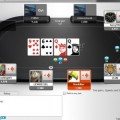
ARJEL Exec Confident Poker Sharing Deal Will be Complete by 2018
A liquidity sharing network involving ARJEL and some of its European counterparts could be live by the first half of 2018 according to Clement Martin-Saint-Leon.

ARJEL’s Head of Consumer Protection Clement Martin-Saint-Leon believes European liquidity sharing could be complete by H1 2018. (Image: europe.wrbriefing.com)
Speaking at the recent World Regulatory Briefing in London, Saint-Leon said that France’s online poker regulator ARJEL is close to finalizing its guidelines for the deal.
The announcement by the governing body’s Head of Consumer Protection signals the first significant step in completing the deal agreed on July 6, 2017.
Following months of speculation and talks, France, Italy, Portugal and Spain formally signed an agreement that will allow player sharing between sites regulated in all four countries.
Although the deal signed in Rome was a breakthrough for regulated online poker in Europe, the logistics will take a while to implement.
A Complicated Web to Weave
Each of the four countries has its own unique system of licensing and regulation, which means they must come up with a dossier of technical rules they expect to use when the network goes live.
Although he admitted he doesn’t know how far his counterparts have gotten, Saint-Leon told those at the World Regulatory Briefing that France’s document will be published imminently.
Based on the work by his own team, Saint-Leon also said that his optimistic everything will be in place by the first half of 2018. While this timeline is tentative, France clearly has a strong desire to complete the process as swiftly as possible.
Since ARJEL took control of online poker in France back in 2010, cash games have suffered. Aside from high taxation pushing out smaller operators, cash game revenue fallen on a consistent basis. At the close of 2016, Q4 revenue had fallen 0.4 percent year-on-year.
As well as being a disappoint end to 2016, the result was the 21st consecutive drop in cash game takings for French operators.
More Players Needed to Help European Poker
In addition to high taxation and tough regulation stifling growth, a lack of players has contributed to the continued fall in revenue. Based on this, France has become a leading voice in the push for a liquidity sharing deal.
When things are complete, many expect all players in the equation to benefit from the flow of players across continents. However, without major poker nations such as Germany and the UK in the mix, the level of traffic still won’t be enough to take things back to how online poker was pre-UIGEA (Unlawful Internet Gambling Enforcement Act of 2006).
After the US poker market fell apart in 2006, the entire industry fragmented and has struggled to find its feet ever since. If, however, Saint-Leon’s optimism is warranted, then it could be another step in the right direction not just for the four European nation’s involved, but the poker industry as a whole.















0 Comments